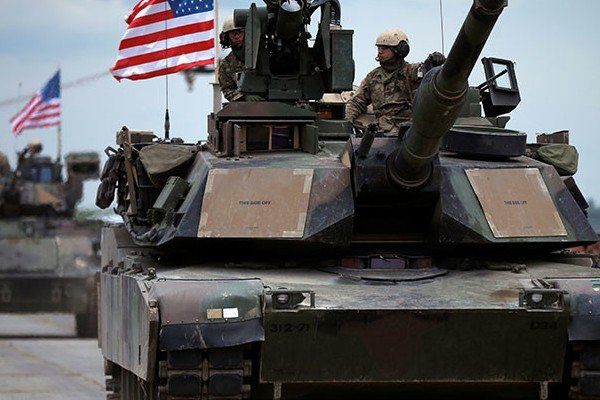U.S. clinging tight to Iraq occupation

It has been almost 15 years since the US invaded Iraq and overthrew Saddam Hussein, falsely claiming he had WMD. While Iraq has defeated ISIS, also known as Daesh, Washington is still seeking excuses to prolong its stay in Iraq.
The invasion of Iraq, dubbed by the US as “Operation Iraqi Freedom” lasted from 20 March to 1 May 2003 in which a combined force of troops from the United States, the United Kingdom, Australia and Poland came together to destroy the regime and, in turn, much of Iraq’s infrastructure.
Military intervention for the alleged promotion of “democracy” is one of the most controversial US policies in the Middle East. It’s a joke, actually. The US presence in Iraq has not brought liberty and peace, but after the passage of almost 15 years since the invasion, Iraq remains in much worse shape that it was before March 2003. The war in Iraq claimed by some accounts over a million lives and almost 5000 US lives.
In 2011, after nearly nine years, the US formally claimed an end to US military operations in Iraq. But in fact they did not end. US bombing of targets in Iraq has long continued, but most of the US effort has been to train Iraqi security forces.
Washington called the day “historic” and claimed that it brought closure to the US mission in Iraq’s soil, and also created a democratic and stable Iraq, but in reality only chaos remained.
Terrorism, US gift for Iraqis
At the alleged end of US mission in Iraq, and while the Iraqi military was moribund, the climate was set for the rise of violence and the birth of a new type of terrorist entity, the Islamic State of Iraq and Syria or ISIS. Although after the onset of Syrian crisis, ISIS gained more momentum, the roots of the menace was in the occupation of Iraq by US forces. Following the rise of ISIS, and the occupation of Iraqi cities such as Mosul, by ISIS, American forces created more bases in the country.
In June 2014, an American-led intervention in Iraq started, when President Barack Obama ordered US forces to be dispatched to the region, in response to offensives in Iraq conducted by ISIS. The White House described the operation as an attempt to defeat ISIS and provide consultation for Iraqi security forces. The real defeat of ISIS, however, was really accomplished by Iraqi forces. Iraqi Prime Minister Haidar al-Abbadi's government announced that U.S. troops should leave Iraqi territory and consequently the withdrawal process began. But there are still fears that the US may find other reasons to stay in Iraq.
Earlier, al-Akhbar newspaper reported that the Unity Alliance of Iraq (I'itilaf Wahdat al-Iraq) decided to seek Americans to take responsibility for securing elections in Sunni Iraqi provinces and to be deployed instead of the People's Mobilization Committee (PMC), the anti-terrorism forces in these provinces. In this regard, the People's Mobilization Committee (PMC) criticized these requests, which could be used to legitimize the continued occupation of Iraq by the Americans.
Washington’s pretext to stay in Iraq
Iraqi PM Haitham al-Jubouri recently announced in a television interview that there are more than 35,000 to 40,000 US troops in Iraq. Some of them are merely advisors, but many are not. The President of the parliamentary Commission of Security and Defense, Hakim al Zamily, has emphasized that U.S. occupation forces are seeking permanent military bases in Iraq and have set about trying to create them. “America's goal is apparently to establish a balance of power with Iran and Russia,” he said.
It appears to some Iraqi observers that the US may be attempting to bribe the Iraq government in same fashion, including the refusal to supply funds for reconstruction, to maintain its presence in the country. It seems the US does not want a sovereign Iraq after all.
